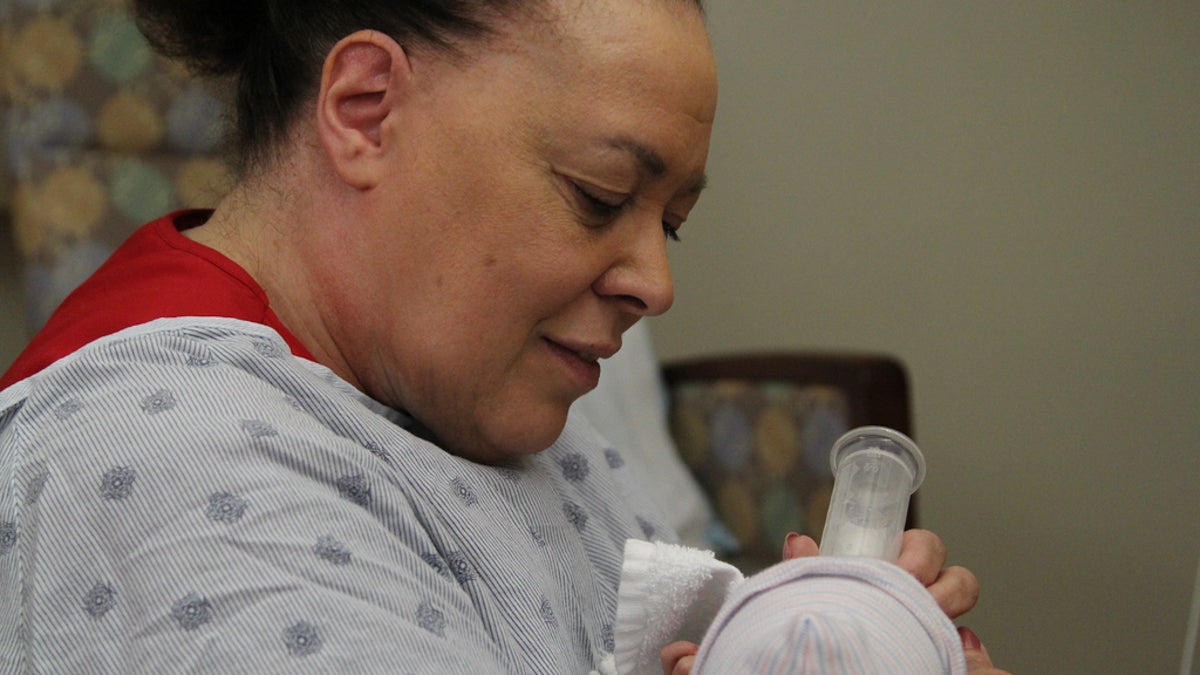Cuddling as medicine for babies going through withdrawal
Listen
Beverly Thornton holds a baby at Magee Women’s Hospital in Pittsburgh. (Sarah Schneider/for WHYY)
Babies born addicted to opioids need to be help. Fortunately, people like Beverly Thornton like to do that.
Beverly Thornton cuddles babies on Wednesdays.
She says when she walks into the neonatal intensive care unit at Magee Women’s Hospital in Pittsburgh she can sometimes hear babies crying.
“So I know somebody is going to need my attention right away,” she said.
The hospital started the “cuddler” program in 2005 when they saw a drastic increase in babies born addicted to opioids (doctors call it neonatal abstinence syndrome) says Maribeth McLaughlin, Vice President of operations at Magee. Between five to 10 percent of babies at Magee have NAS. In the last 15 years, the rate of neonatal hospital stays in Pennsylvania related to substance abuse has increased 250 percent.
The babies going through withdrawal struggle to digest formula or breast milk, which leads to loose stools and extreme irritability.
Typically those symptoms can be eased with human contact.
“Swaddling them, holding them close. The rocking affect helps manage those symptoms and make them a little less irritable,” McLaughlin says.
A few years ago Thornton saw an episode of 60 minutes that featured a similar program. She doesn’t have children of her own but she has gotten to know dozens of babies who she said just need to be held.
“I remember lots of them for different reasons. Some of them seem to be having a much harder time and needed a little bit more time with me,” she said. “I may go in one day and hold the same baby for the entire shift. Other days I might hold three or four babies, it just depends. I don’t remember them by name necessarily but I just remember the experience with them.”
She sings to the babies. She tells them it’s going to be okay. She assures them that they will get to go home soon. All the while, she’s watching the baby’s heart rate monitor.
“No matter how much the baby seems to be struggling or what a tough time they’re having, I can always look at the monitor and see that I’ve had an impact when they get very agitated or their heart rate goes up very high,” she said. “But, usually within a certain amount of time, if you’re holding the baby and you find just the right position … you can see the monitor go down and their heart rate kind of slows down.”
Thornton is retired and volunteers for various organizations across Pittsburgh, but she said she feels most present in her life when she’s rocking a baby at the hospital.
“While their monitors are going down, probably if I had a monitor on, mine would be going down as well because you’re relaxed but you’re focused on them,” she said.
Ready to sign up? Magee’s volunteer coordinators say the wait list to be a cuddler is about 400 names long.
WHYY is your source for fact-based, in-depth journalism and information. As a nonprofit organization, we rely on financial support from readers like you. Please give today.



